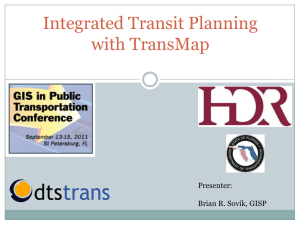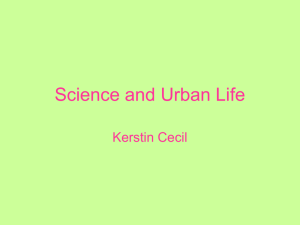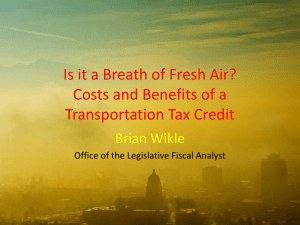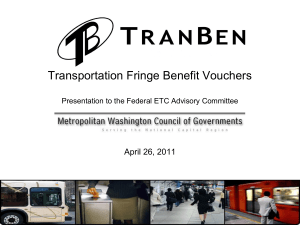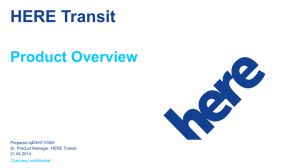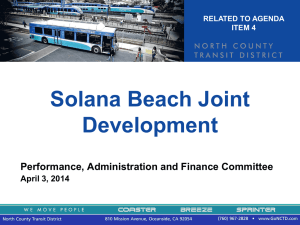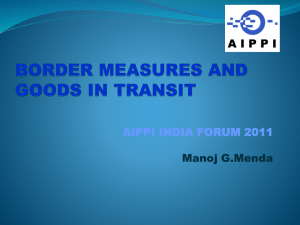Transit Data Warehouse - the Atlanta Regional Commission
advertisement
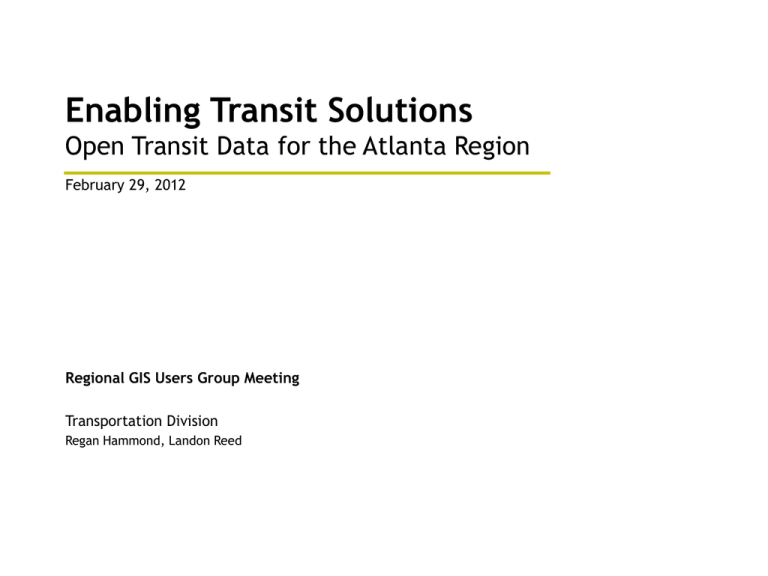
Enabling Transit Solutions Open Transit Data for the Atlanta Region February 29, 2012 Regional GIS Users Group Meeting Transportation Division Regan Hammond, Landon Reed Who is familiar with Open Data? 2 Topics Discussed • Select Issues in Transit • What is Open Transit Data? • Regional Transit Data Warehouse • Open Data and Innovations • Case Study Observations 3 Disconnected regional transit system Regional Connectivity Cost Effectiveness Information Equity Land Use Impacts 4 Costly Information Delivery Custom Schedules per Route Hosting Phone Number Flickr/TheTransitCamera Flickr/Cubcake Photography Electronic Signage Flickr/BristolRE2007 Regional Connectivity Cost Effectiveness Information Equity Land Use Impacts 5 Equitable Information Access Personal Technology Limitations Considering All Abilities/ADA Access Regional Connectivity Cost Effectiveness Information Equity Land Use Impacts 6 Impacting Land Use/Mode Choice • We all know where we live in relation to the freeway. • What if you knew more about transit? Regional Connectivity Cost Effectiveness Information Equity Land Use Impacts 7 Evolution of Transit Data Paper Schedules Digitization Interactivity Schedule 10 9:36 8 How does Open Data help? Agency produces data and opens it once. Transit Agency Agency responds to individual, special requests by developer DATA Anyone can access data App Developers Riders Small subset of riders find this specific tool useful. Many riders access a diverse market of tools powered by GTFS. 9 Developer Perspective Data Hub 10 Developer Perspective Standardized Data Hub 11 General Transit Feed Specification (GTFS) shapes.txt routes.txt agency.txt trips.txt stops.txt stop_times.txt calendar.txt GTFS 12 Regional Transit Data Warehouse • Enables regional approach to collection, management, and distribution of transit system data – – – Performance Fleet & Facilities Inventory Operations • Supports ARC’s transit performance monitoring • Public interface to explore transit options through online, interactive map of regional system • Provides General Transit Feed Specification (GTFS) to third-party developers wishing to leverage available data 13 Transit Data Warehouse 14 15 16 17 18 Government as a Platform • Public Transportation Agency: – Safe, efficient transit operations • Data generated as a by-product of operations • Releasing data to developers empowers them to address certain issues they see. 19 Google Transit • Sharing GTFS with Google allows Atlanta to show up on Google Transit http://maps.google.com 20 HopStop • Bus schedule in more concise and user-friendly format • Personalized schedule data based off user’s GPS location • Enables multi-agency trip planning • Highly popular nationwide application • Available for all major smart phone platforms http://www.hopstop.com Regional Connectivity Cost Effectiveness Information Equity Land Use Impacts 21 OpenTripPlanner http://www.opentripplanner.com Regional Connectivity Cost Effectiveness Information Equity Land Use Impacts 22 Direct Agency Benefits • TimeTablePublisher – An application that runs exclusively on GTFS – Produces print-quality schedules for all routes, directions – Creates web-ready formats for agencies too – No cost to the agency – One of many open source tools http://code.google.com/p/timetablepublisher/ Regional Connectivity Cost Effectiveness Information Equity Land Use Impacts 23 Equity in Information Access • Agency sponsored information projects must be ADA compliant • Open data enables developers who specialize in accessible apps to access local market – Interactive Voice Response (IVR) – SMS Schedule Access – Transit Assistive Devices (TADs) Regional Connectivity Cost Reduction Information Access Land Use Impacts 24 Walk Score: Apartment Search http://www.walkscore.com Regional Connectivity Cost Reduction Information Access Land Use Impacts 25 Case Study Approach • Transit Agencies – Philadelphia – San Francisco – Chicago – New York – Boston • Email and phone interviews with staff 26 Development Cost Scenarios • Multiple Platforms: BART Experience – Deployed apps for multiple devices – Too costly to keep up with evolving technologies • Custom Solution: goroo – Multimodal trip planner – Only works in Chicago – Costs >$4,000,000 to public • Open Source: OpenTripPlanner – Deployed in Portland – Estimated ~$140,000 Source: Biernbaum, Rainville, Spiro. Multimodal Trip Planner System Final Evaluation report (2011) 27 Key Lessons Learned • Open data should be accurate and up-todate – Transit riders will rely on the data – Construction, closures, schedule changes should be updated. • Staff-level champions and strong leadership leads to successful deployments 28 Key Lessons Learned • Express agency concerns through usage agreements – Logo and transit map usage – Ensuring developers don’t misrepresent themselves or apps as “official” Developers Agencies • Developer Relationships – Different levels of engagement – Support for mutual customers z Transit Riders 29 Performance Measures • Ways to track usage – GTFS downloads – App downloads – Number of apps developed • App Accessibility Inventory • Market Research Surveys 30 Where is Georgia in the Open Data trend? 31 Atlanta: State of the Region • No Atlanta transit agencies provide data in an open format … yet. • MARTA has a GTFS feed – Provides to Google Transit and HopStop – Not Open • Smaller agencies need to create and open feeds • ARC developed Regional Transit Data Warehouse • Successful discussion on open data with TOS & RTC 32 ARC: Moving Forward • Providing staff support for agencies • Deploy Regional Transit Data Warehouse • Continuing to advocate for open data • Hosting “hackathon” to encourage innovation and help address transit needs – Looking at Summer 2012 – Collaboration with Georgia Tech 33 Contact Information Regan Hammond Principal Planner 404.463.3269 | rhammond@atlantaregional.com Landon Reed Transit Planning Intern 404.463.3283 | lreed@atlantaregional.com 34
